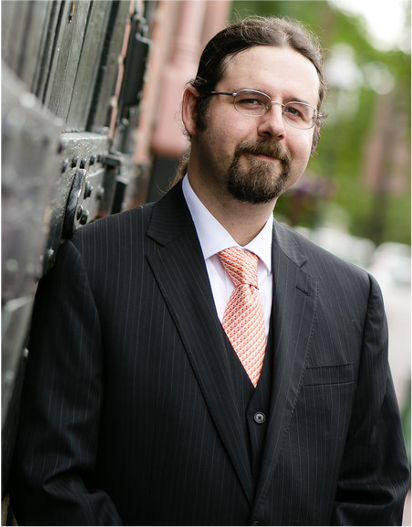Bradley Cramer is an Associate Professor in the Earth and Environmental Sciences Department.

What is the focus of your work?
My work is deeply interdisciplinary and if you asked a dozen people what I do, you would probably get ten different answers.
At its core, I work on Earth System Science and my primary research focus is on biogeochemistry and the global carbon cycle. I investigate intervals of Earth history where extreme perturbations in the global carbon cycle (i.e., climate change) co-occurred with major extinction events. I utilize the biological, geological, and chemical records of these events to try to determine the ultimate causes and consequences of these critical moments in the evolution of the Earth-life system.
Another aspect of my research revolves around the search for critical minerals and rare earth elements (REEs), which are both vital components required for the green-energy revolution. We currently do not have a fundamental understanding of how these elements are cycled within the Earth System and this is a priority science question for the National Science Foundation.
The most rewarding part of my work is focused on improving undergraduate STEM education and building the GEO-STEM workforce for the 21st Century. It is in this final arena that I helped to develop the Ashton Prairie Living Laboratory (APLL) at Iowa with CLAS. The APLL is a 10-acre prairie restoration project at the Ashton Cross Country Course that is used as an on-campus outdoor classroom for a range of courses across the UI that is already seeing more than 500 students per semester take a class at the facility.
My career has always been focused on bringing disparate disciplines and scientists from around the world together to work on global problems and it has been rewarding to apply those skills to the University of Iowa to help to provide our students a truly unique opportunity and help to make Iowa a destination campus for students interested in all aspects of the environment.
Tell us about the broad impact it has/could have.
The potential impacts of this work fall into three categories.
The first is the research on global change events and the demonstration of the combined effects of changes in the global carbon cycle and oceanic nutrient availability have on the total Earth system. Today we are seeing tremendous increases in both atmospheric CO2 as well as nutrient runoff to the oceans and these ancient ‘experiments’ the Earth has already conducted are the best roadmap to determine the potential outcomes of our future if we remain on our current path.
The second impact is the search for critical minerals. The green-energy revolution will come to a grinding halt if we cannot secure vastly larger quantities of critical minerals for the technology required by solar panels, wind farms, batteries, etc., and our research will hopefully be able to identify previously unknown resources.
Finally, the complexity of environmental research and education revolves around the operation of the Earth and the environment as a system. Teaching how these systems work independently, and as a collective whole, is challenging enough when students are limited to textbooks, lectures, videos, and indoor laboratories. The most effective way to train Earth and Environmental Science students is to provide experiences in the environment that demonstrate how each component operates within the larger system.
What excites you about the environment in CLAS?
I deeply enjoy the ability to work across disciplines, not only in the natural sciences, but throughout CLAS and across campus. I have co-taught courses and held academic meetings with faculty from the social sciences and the humanities, and firmly believe that the Obermann Center is one of the best features of the University of Iowa.
What are your hobbies and pursuits outside of work?
I am a former musician and spent a decade (a long, long time ago) performing and recording music. Today, I spend most of my free time with my wife and kids as well as working on our yard and garden. The overwhelming majority of the outdoor time is spent combating the effects of deer and chipmunk snacking and weeding invasive species. Our cat and dog keep us company and do their best to keep the animal grazers to a minimum.
What are your favorite things to do in Iowa City?
Eat. I love trying all of the wonderful foods that Iowa City and the surrounding area has to offer. From proper restaurant meals to random food trucks, to the farmer’s market, I love to spend time seeing what new things the city will offer next.